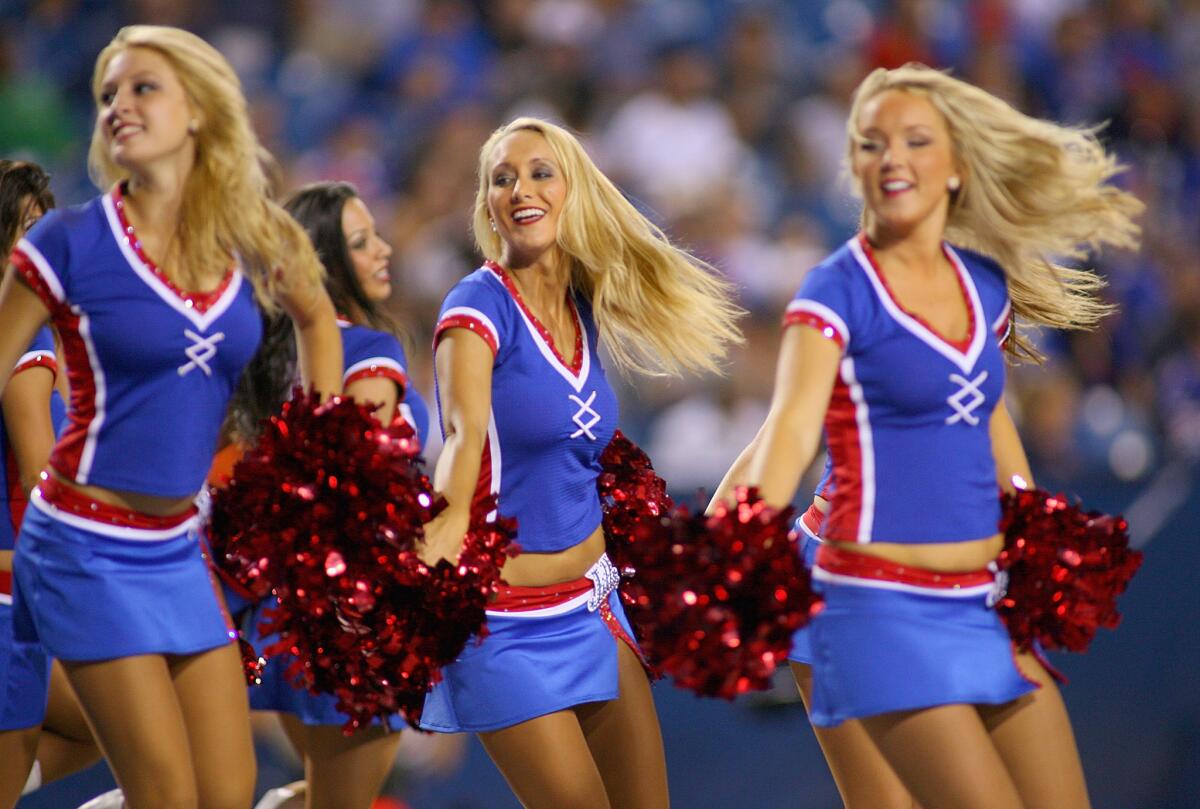Buffalo Bills, like Raiders and Bengals, hit with cheerleader lawsuit

They had to pass a “jiggle test.”
They were instructed when to change their tampons and how to properly wash “intimate areas.”
They were required to appear in bikinis at an annual golf tournament, where they were stuck in a dunk tank or “auctioned off” and made to ride around in golf carts on the laps of winning bidders.
These are among the allegations in a wage theft lawsuit filed this week in New York Supreme Court by five former Buffalo Bills cheerleaders who say they were exploited by the team, which generates $256 million in annual revenue.
They have named as defendants not just the Bills, but two companies that managed the cheerleading squad, Citadel Communications (which owned the Bills’ “official” radio station) and Stejon Productions Corp.
The cheerleaders, by the way, are not claiming that demeaning things like the jiggle test, dunk tanks and auctions were illegal. Those are just examples of the poor way they were treated. Their legal claim is that they weren’t paid for their time.
In fact, they were hardly paid for anything.
Not their practices. Not their performances on game days. Not for mandatory appearances at events like “The Man Show” at a Niagara Falls casino, where they were required to wear skimpy attire and be “paraded around for the gratification of the predominantly male crowd,” according to the lawsuit.
Nor were they paid, they claim, for mandatory appearances at cheerleader camps for “Junior Jills,” where 300 to 400 girls each paid $250 to attend.
On game days, Jills were given one ticket, worth $90, and a $25 parking pass. Sometimes, at the discretion of their managers, they were selected to participate in paid appearances. But there were no guarantees for paid work, according to the lawsuit, and some Jills were never selected for it.
They estimate in their lawsuit that they put in about 20 hours of unpaid labor per week, totaling 840 hours of unpaid work per year. For nearly a year’s work the plaintiffs earned between $105 and $806. For the 2010-11 season, one earned an eye-popping $1,800. But out of that, they had to buy their own uniforms, which cost about $650.
If this all sounds familiar, it’s because this is the third lawsuit filed this year against a professional football team by disenchanted cheerleaders.
In January, former Oakland Raiderette Lacy T. kicked things off with a wage theft lawsuit against the Raiders. She was soon joined in the lawsuit by a second former Raiderette, Sarah G. In February, former Cincinnati Ben-gal Alexa Brenneman filed a similar lawsuit against her team, alleging her pay worked out to about $2.85 an hour.
“It takes a courageous person to move us forward, and Lacy was that person,” said the Jills’ attorney, Frank Dolce. “She was a motivating moral compass for our plaintiffs.”
The suits allege that cheerleaders were not paid minimum wage for their work, not paid in a timely manner, not reimbursed for mandatory expenses, and penalized for minor infractions with unlawful deductions from their meager earnings. The Jills also allege they were illegally denied gratuities that were collected by the company that managed them.
The former Raiderettes attorney, Leslie Levy, said today she thinks the mistreatment of professional cheerleaders is reaching critical mass on two levels. “One is that we hope that more women will feel empowered to come forward and correct what is clearly illegal and unfair treatment. But we also hope that the NFL is getting the message that they can’t continue to use illegal and unfair contracts and employment practices.”
How have the teams responded?
The Raiders, which have made no public statements about the case, have claimed in court documents that cheerleaders aren’t legally entitled to sue because their contract says they must arbitrate with the NFL commissioner. Levy and her colleague Sharon Vinick are challenging the forced arbitration clause, and are due to address the issue on May 14 in Alameda County Superior Court.
The Bengals have said they will address their lawsuit “in due course.”
The Bills have also declined to respond to the lawsuit. However, the Buffalo News reported today that the manager of the cheerleading squad announced that she had suspended the program.
“We are proud to shut this illegal, disrespectful operation down,” said Dolce, who is representing the five former Jills, identified as Jaclyn S., Alyssa U., Maria P., Melissa M. and Gina B. “We love the Bills, we love the Jills and we think it would be insane to stop the functioning of the Jills altogether. Do we want better management, and legal conduct? Yes, we do.”
Dolce said the Jills’ employment agreement does not contain an arbitration clause. The lawsuit argues that they are mistakenly classified as “independent contractors” but are in reality employees.
I’ve heard critics say that cheerleaders enter this servitude with their eyes open, that the prestige of the job or the chance to mingle with professional athletes should be compensation enough. (Never mind every team’s strict “no fraternization” policy.)
That’s no excuse to exploit them.
Cheerleaders bring entertainment value, including, yes, a certain sexual zing to football.
And why not? Like all professional athletes, dancers are valued for their bodies and their physical prowess.
But like all professional athletes, they deserve fair compensation for their work. Dangling them as sponsor bait would not be nearly so offensive if they were treated with respect and paid for their time.
As it happens, not all teams are operating in this weird time warp.
The Seattle Seahawks pay their cheerleaders, the Sea-Gals, for all the hours they put in, including overtime. That’s as it should be.
After all, says Forbes, the NFL is the most lucrative sports league in the world.
The average team is worth $1.17 billion.
So why, in an incredibly profitable industry of millionaire players and billionaire owners, should the professional pom-pom shakers not get their own fair shake?
Twitter: @robinabcarian



